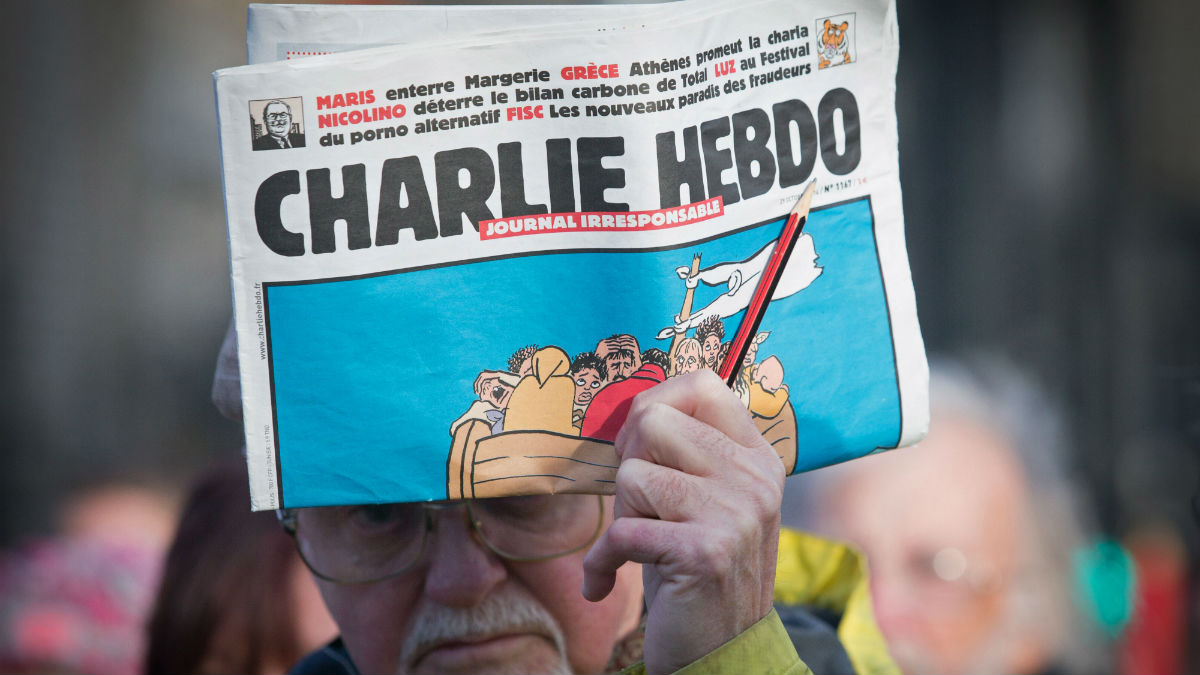Charlie Hebdo: is Alan Kurdi cartoon racist?
Controversial magazine's drawing of drowned Syrian refugee sparks racism debate around world

A free daily email with the biggest news stories of the day – and the best features from TheWeek.com
You are now subscribed
Your newsletter sign-up was successful
A controversial cartoon published in France's Charlie Hebdo magazine has sparked a global debate about racism, satire and freedom of expression.
The image depicts three-year-old Syrian refugee Alan Kurdi, who drowned attempting to cross the Mediterranean last year, showing him as an adult committing a sex crime in Germany.
"What would have happened to little Alan if he'd grown up?" it asks, before answering: "A groper of women in Germany," in a clear reference to the sexual assaults committed in Cologne last month.
The Week
Escape your echo chamber. Get the facts behind the news, plus analysis from multiple perspectives.

Sign up for The Week's Free Newsletters
From our morning news briefing to a weekly Good News Newsletter, get the best of The Week delivered directly to your inbox.
From our morning news briefing to a weekly Good News Newsletter, get the best of The Week delivered directly to your inbox.
More than 100 women claim they were assaulted by men of apparent North African or Arab origin during the German city's New Year celebrations, triggering outrage and heightening existing tensions in the country.
Many took to social media to condemn the magazine, which they labelled "racist" and "revolting", with ABC's Middle East correspondent Sophie McNeill calling it "outrageous".
Alan's aunt, Tima, said she cried when she saw the cartoon. "To hurt us again, it's not fair," she told CBC News.
However, Financial Times journalist Christopher Thompson said the drawing could simply be poking fun at "sweeping stereotypes about migrants".
A free daily email with the biggest news stories of the day – and the best features from TheWeek.com
It might also represent how the pendulum of public support for refugees has swung back the other way, suggests the Washington Post's Adam Taylor.
"Charlie Hebdo may well have been satirising the fickleness of Europe's sympathy for refugees and migrants, or highlighting the absurdity of linking the many fearful refugee families to the alleged sexual assaults by grown men," he says, but adds: "Even if that's true, however, the satire misses the mark for many."
Journalist Max Fisher, from Vox, agrees. "Even if the ultimate message is to argue against anti-refugee hysteria and to champion the rights of refugees in Europe, it is nonetheless tasteless," he says.
-
 The environmental cost of GLP-1s
The environmental cost of GLP-1sThe explainer Producing the drugs is a dirty process
-
 Greenland’s capital becomes ground zero for the country’s diplomatic straits
Greenland’s capital becomes ground zero for the country’s diplomatic straitsIN THE SPOTLIGHT A flurry of new consular activity in Nuuk shows how important Greenland has become to Europeans’ anxiety about American imperialism
-
 ‘This is something that happens all too often’
‘This is something that happens all too often’Instant Opinion Opinion, comment and editorials of the day
-
 Epstein files topple law CEO, roil UK government
Epstein files topple law CEO, roil UK governmentSpeed Read Peter Mandelson, Britain’s former ambassador to the US, is caught up in the scandal
-
 Iran and US prepare to meet after skirmishes
Iran and US prepare to meet after skirmishesSpeed Read The incident comes amid heightened tensions in the Middle East
-
 Israel retrieves final hostage’s body from Gaza
Israel retrieves final hostage’s body from GazaSpeed Read The 24-year-old police officer was killed during the initial Hamas attack
-
 China’s Xi targets top general in growing purge
China’s Xi targets top general in growing purgeSpeed Read Zhang Youxia is being investigated over ‘grave violations’ of the law
-
 Panama and Canada are negotiating over a crucial copper mine
Panama and Canada are negotiating over a crucial copper mineIn the Spotlight Panama is set to make a final decision on the mine this summer
-
 Why Greenland’s natural resources are nearly impossible to mine
Why Greenland’s natural resources are nearly impossible to mineThe Explainer The country’s natural landscape makes the task extremely difficult
-
 Iran cuts internet as protests escalate
Iran cuts internet as protests escalateSpeed Reada Government buildings across the country have been set on fire
-
 US nabs ‘shadow’ tanker claimed by Russia
US nabs ‘shadow’ tanker claimed by RussiaSpeed Read The ship was one of two vessels seized by the US military